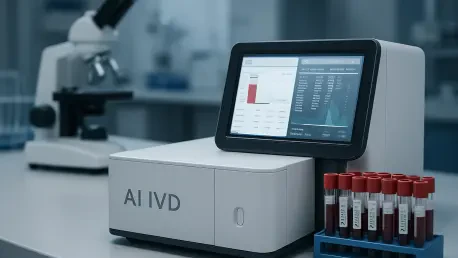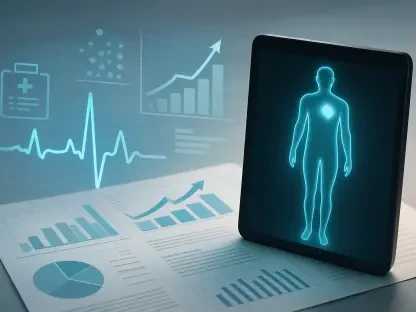By 2034, the transformation of in-vitro inflammatory bowel disease (IBD) diagnostics through artificial intelligence (AI) is expected to be substantial and profound. The growing prevalence of IBD, including Crohn’s disease and ulcerative colitis, combined with the pressing need for personalized medicine, underscores the importance of evolving diagnostic techniques. AI promises to revolutionize the way these diseases are diagnosed and managed, potentially leading to increased accuracy and efficiency in detection and treatment. This burgeoning field holds the promise of more precise diagnostics, reinforcing the potential to significantly enhance patient outcomes. With the in-vitro IBD diagnostics market projected to grow substantially, the role of AI in this evolution cannot be underestimated.
Technological Innovations in Diagnostics
The integration of AI in in-vitro IBD diagnostics signals a notable shift in how diagnostic tests are conducted, offering a level of precision that traditional methods cannot match. AI technologies are being designed to interpret complex datasets rapidly, enabling them to identify patterns that may be missed by human analysis. This capability is particularly critical in diagnosing IBD, where symptoms often overlap with other gastrointestinal disorders. The potential for AI to decipher this complexity with high accuracy can lead to earlier and more definitive diagnoses, allowing for timely intervention.
Biomarker tests, already the frontrunners in the diagnostics market due to their non-invasive nature and specificity, stand to benefit immensely from AI. Machine learning algorithms can analyze biomarker data more comprehensively, offering improved insights into disease progression and patient response to treatment. This not only aids in enhancing the reliability of these tests but also supports the development of new biomarkers that could further distinguish between different types of IBD. The advancements in molecular diagnostics, such as next-generation sequencing and PCR-based techniques, are also expected to leverage AI for optimizing test results and providing a deeper understanding of the underlying genetic factors of IBD.
Market Dynamics and Regional Growth
The projected growth of the in-vitro IBD diagnostics market is fueled by a mix of technological advancements and increasing global healthcare investments. North America, currently dominating the market due to its advanced healthcare infrastructure and high awareness, is expected to maintain its leadership. The region’s commitment to medical innovation and research contributes significantly to the adoption and development of AI-driven diagnostics.
Conversely, the Asia Pacific region is witnessing rapid growth, driven by expanding healthcare infrastructure and a rising incidence of IBD. Countries like India, China, and Japan are channeling substantial investments into healthcare modernization, positioning themselves as key players in the global market. This is further supported by growing awareness regarding early diagnosis and management of IBD, which is crucial for mitigating long-term health complications. The European market also shows promise, with its robust healthcare systems fostering advancements in diagnostic tools. The emphasis on precision medicine in countries like the UK accentuates the acceptance and implementation of AI in diagnostics, offering a blueprint for other regions to follow.
Challenges and Opportunities
Despite the promising advances, the in-vitro IBD diagnostics market faces challenges that need addressing to ensure its full potential is realized. One of the primary hurdles is the limited awareness and accessibility of advanced diagnostics in developing regions. The tendency to misdiagnose IBD due to its symptom overlap with less severe conditions remains a significant barrier to timely treatment. Moreover, a shortage of specialized diagnostic laboratories and trained personnel in these areas adds to the complexity of the issue.
However, these challenges pave the way for opportunities in expanding diagnostic capabilities and training medical personnel to utilize these advanced technologies effectively. Awareness initiatives are crucial in spreading knowledge about the benefits and availability of AI-driven diagnostics. Collaborative efforts between public health sectors, private enterprises, and educational institutions can drive significant progress in this area. Additionally, the development of cost-effective AI solutions tailored to low-resource settings is essential for democratizing access to innovative diagnostics.
Conclusion
The remarkable growth trajectory of the in-vitro IBD diagnostics market underscores the pivotal role of AI in reshaping the landscape of medical diagnostics. By enhancing the accuracy, speed, and reliability of diagnostic tests, AI holds the promise of transforming patient care for those affected by IBD. The market’s expansion is fueled by increased healthcare investments and a higher demand for personalized medicine, driven by the realization of AI’s potential in delivering precision-based diagnoses and treatments. Moving forward, overcoming the challenges of awareness, access, and technological disparities remains crucial in ensuring AI’s benefits are universally experienced. As the global healthcare industry continues to embrace digital transformation, AI-driven in-vitro IBD diagnostics are poised to become indispensable tools in managing inflammatory bowel diseases, ultimately improving patient outcomes and quality of life.









